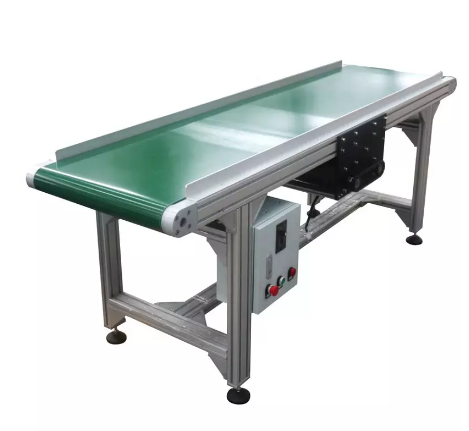
In today’s fast-paced industrial world, selecting the right automatic aluminum conveyor is essential. It directly impacts your efficiency, cost-effectiveness, and overall productivity.
In this post, we’ll walk you through the critical factors to consider when choosing the best conveyor for your business. You’ll learn how to assess your product’s needs, operating environment, and more.
Introduction: What Is an Automatic Aluminum Conveyor?
Automatic aluminum conveyors are essential tools for moving materials efficiently during production. They help industries handle materials from one stage to the next, ensuring smooth and fast operations.
These conveyors are built to last, using high-strength aluminum for durability and lightweight performance. They are ideal for environments that demand high efficiency, such as manufacturing and food processing. You can check how does a aluminum conveyor work to know more about details.
Key Features of Automatic Aluminum Conveyors:
Durability: Resistant to wear and tear, making them reliable for long-term use.
Corrosion Resistance: Perfect for environments exposed to moisture or chemicals.
Energy Efficiency: Lightweight design reduces energy consumption during operation.
Why Choose an Aluminum Conveyor System?
Aluminum conveyor systems offer numerous advantages for businesses looking to streamline their operations. Whether you’re dealing with bulk materials or delicate products, aluminum conveyors can provide the ideal solution.
Benefits of Aluminum Conveyor Belts
Enhanced Durability: Aluminum conveyors are known for their strength and durability. Despite being lightweight, they can handle heavy loads, making them perfect for demanding tasks on production floors or in assembly lines.
Corrosion Resistance: Aluminum naturally resists corrosion. This feature is especially beneficial in environments where the conveyor is exposed to moisture, chemicals, or harsh conditions. It reduces the need for frequent maintenance or replacement.
Energy Efficiency: Due to their lightweight nature, aluminum conveyors consume less energy compared to heavier options. This means lower operating costs and a more eco-friendly operation, which is crucial for long-term savings.
Applications of Aluminum Conveyors
Manufacturing: Aluminum conveyors are widely used in production environments to transport goods through various stages, ensuring continuous flow. They are especially efficient on assembly line conveyors, where seamless movement is essential for maintaining productivity.
Food Industry: In the food processing sector, hygiene is a top priority. Aluminum conveyors, with their easy-to-clean surfaces, are ideal for such applications. They meet the strict cleanliness standards required for food handling.
Pharmaceuticals: Similar to food industries, pharmaceuticals demand high cleanliness. Aluminum conveyors are designed to transport sensitive products while preventing contamination. Their smooth surfaces are perfect for maintaining hygiene.
How to Choose the Right Automatic Aluminum Conveyor for Your Business
Choosing the right automatic aluminum conveyor is a critical step in optimizing your business’s material handling system. A well-chosen conveyor will improve efficiency, reduce costs, and integrate seamlessly with your existing operations. Here's a step-by-step guide to help you select the best conveyor for your needs.
Step-by-Step Guide to Selection
1. Assess Your Product Characteristics
Start by considering the key attributes of the products you’ll be moving. Think about their size, weight, and sensitivity:
Size: Is your product large or small? The dimensions will determine the conveyor width and the kind of system you need.
Weight: Heavier products need a conveyor that can handle the additional load without straining. Aluminum conveyors are great because they can support significant weight while staying lightweight themselves.
Sensitivity: If your items are fragile, like electronic components or delicate food products, you may need a conveyor that operates at lower speeds to prevent damage.
2. Consider the Operating Environment
The conditions in which the conveyor will operate play a big role in choosing the right system. Temperature, humidity, and potential contaminants such as dust, chemicals, or moisture can all affect the conveyor's performance:
If you're working in a high-temperature environment, aluminum's natural thermal stability makes it a suitable choice.
If your environment is moist or exposed to corrosive chemicals, aluminum's corrosion resistance ensures the conveyor lasts longer and requires less maintenance.
3. Determine Speed and Capacity Requirements
How fast do you need the conveyor to move your products? Speed and capacity are essential to optimizing throughput. For instance:
If you have a high-demand production line, a conveyor that can operate at faster speeds with high throughput is crucial.
The conveyor’s capacity should match your business’s operational volume, so ensure it can handle the weight and number of items you need to transport.
4. Evaluate Space Constraints and Layout
The layout of your facility will affect where and how your conveyor system fits into the workflow. Take into account:
The available floor space: Is the area cramped, or do you have ample room for a ground-level conveyor?
Ceiling height: If floor space is limited, an overhead conveyor system might be a more suitable option to use vertical space efficiently.
5. Choose a Conveyor Type
There are different types of automatic aluminum conveyors, and choosing the right one depends on your specific needs:
Belt conveyors are versatile and commonly used for a variety of materials.
Roller conveyors are great for heavy or large items.
Modular conveyors offer customization for flexible layouts.
Overhead conveyors make use of space above the floor and are great for areas with limited ground space.
6. Ensure It Integrates Well with Existing Equipment
Your new conveyor should work smoothly with your existing equipment and systems. Check if it’s compatible with:
Common Mistakes to Avoid
1. Not Considering Product-Specific Needs
One common mistake is failing to take your products' unique characteristics into account. For example:
If you don’t factor in product fragility or size, the conveyor may not handle the items efficiently. Larger or more delicate items need extra care, so choosing the wrong system might result in costly damage or inefficiencies.
2. Overlooking Maintenance Requirements
Another mistake is focusing too much on upfront costs and opting for a cheaper system. While cost is important, ignoring long-term maintenance requirements can lead to higher repair costs. Look for a conveyor that:
Key Factors to Consider When Choosing an Automatic Aluminum Conveyor
Choosing the right automatic aluminum conveyor involves understanding various factors to ensure optimal performance for your business. From the products you handle to your workspace environment, here’s what you need to consider:
1. Understanding Your Product Characteristics
Size, Weight, and Shape
Dimensions: Evaluate the length, width, and height of the items you plan to move. A conveyor that’s too narrow can cause items to fall off, while a system that’s too wide wastes space and energy. Finding the right balance is key to maximizing efficiency.
Weight: Ensure the conveyor can handle the weight of your materials. Overloading a conveyor will lead to strain on its components, reducing its lifespan and causing potential breakdowns.
Material Sensitivity
Fragility: Fragile products require special care. Choose a conveyor that can move items gently, perhaps at slower speeds, to avoid damage.
Heat Sensitivity: If your materials are sensitive to temperature, opt for a conveyor designed to handle extreme heat or cold. Aluminum’s natural thermal stability is an advantage here.
2. Assessing the Operating Environment
Temperature and Humidity
Potential Contaminants
If your business handles materials exposed to chemicals, dust, or other contaminants, aluminum conveyors are an excellent choice. Aluminum’s resistance to corrosion makes it easy to clean and maintain, ensuring longer service life and reducing contamination risks.
3. Evaluating Speed and Capacity Needs
Determine the speed and capacity your business requires. If your production line operates at a high pace, you’ll need a conveyor capable of moving materials quickly and efficiently.
On the other hand, for businesses that require precise transfers or slower movements, consider a conveyor system designed for controlled, slower speeds.
The conveyor should also match your throughput requirements to handle the volume of products you need to transport.
4. Integration with Existing Equipment
Assess how the conveyor will integrate into your current production line or equipment. Does it need to connect to automated systems, packaging machines, or robotic arms? Seamless integration with existing equipment is crucial for maximizing productivity and minimizing downtime.
Look for conveyors that are compatible with your current setup and can be easily customized for integration.
5. Space and Layout Considerations
Floor Space: Ensure that your conveyor system will fit into your available workspace. A conveyor that’s too large for the space can lead to inefficiencies and may even cause accidents if it obstructs pathways.
Overhead Space: If your factory floor is crowded, consider overhead conveyors to maximize the use of vertical space. These systems are ideal for businesses with limited floor space but ample ceiling height.
Taking these factors into account will help you choose the right automatic aluminum conveyor that fits your needs and improves your operational efficiency.
Conclusion
Choosing the right automatic aluminum conveyor is crucial for optimizing your material handling. By considering product characteristics, the operating environment, and integration needs, you can select a system that boosts productivity and reduces costs. The right conveyor system will also support your long-term business goals and ensure smooth operations.
FAQs
1. What are the key benefits of using an automatic aluminum conveyor system?
Automatic aluminum conveyors offer enhanced durability, corrosion resistance, and energy efficiency. They can handle heavy or bulk materials while being lightweight. Their ability to resist corrosion ensures long-term use, even in challenging environments. Aluminum conveyors are also energy-efficient, reducing operational costs.
2. How do I determine the right conveyor size for my products?
Start by assessing the size, weight, and shape of the items you need to transport. The conveyor should be wide enough to prevent items from spilling but not too wide to waste space and energy. Ensure the system can support the weight of your products without overloading its components.
3. Can aluminum conveyors handle temperature-sensitive materials?
Yes, aluminum conveyors are ideal for environments with temperature extremes. Aluminum’s natural thermal stability allows it to handle both high and low temperatures without compromising performance. This makes it a great choice for temperature-sensitive materials.
4. How do environmental factors affect the selection of an aluminum conveyor?
Environmental factors like temperature, humidity, and exposure to contaminants (e.g., dust or chemicals) play a significant role in conveyor selection. Aluminum conveyors excel in these environments due to their corrosion resistance and ability to maintain consistent performance in harsh conditions.
5. How can I integrate an aluminum conveyor into my existing production line?
When selecting a conveyor, consider how it will integrate with your existing systems. Look for conveyors that can easily connect to automated systems, packaging machines, or robotic arms. Ensuring seamless integration will minimize downtime and boost productivity.









